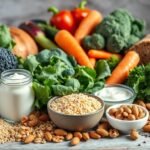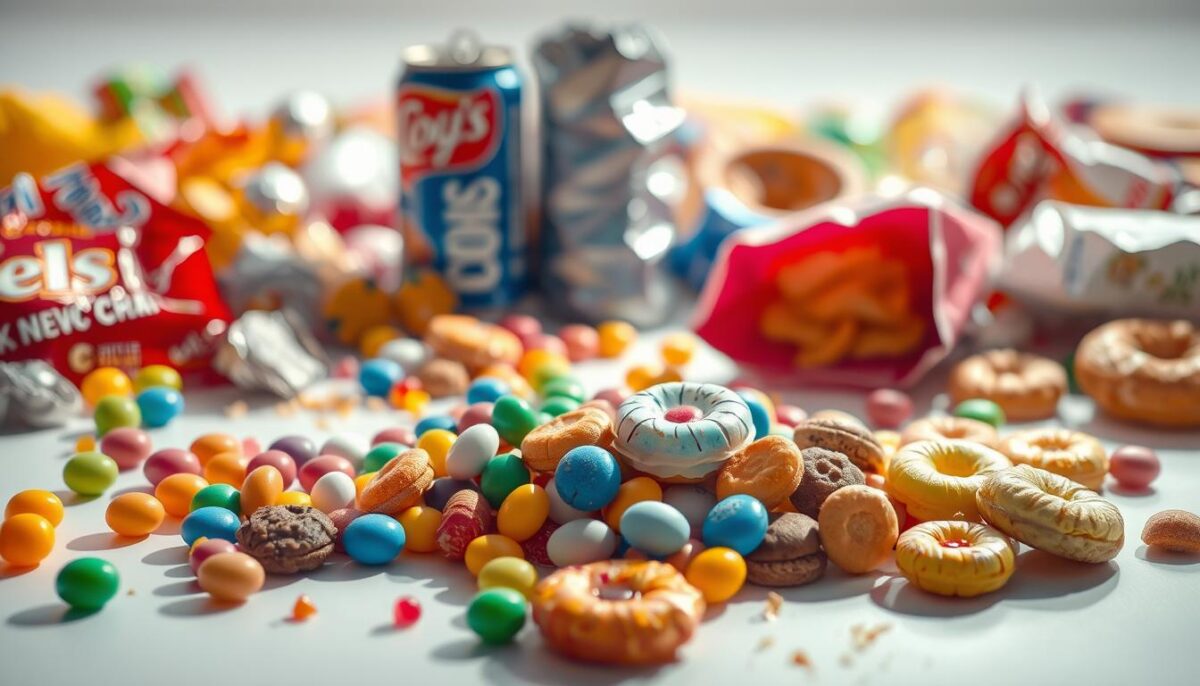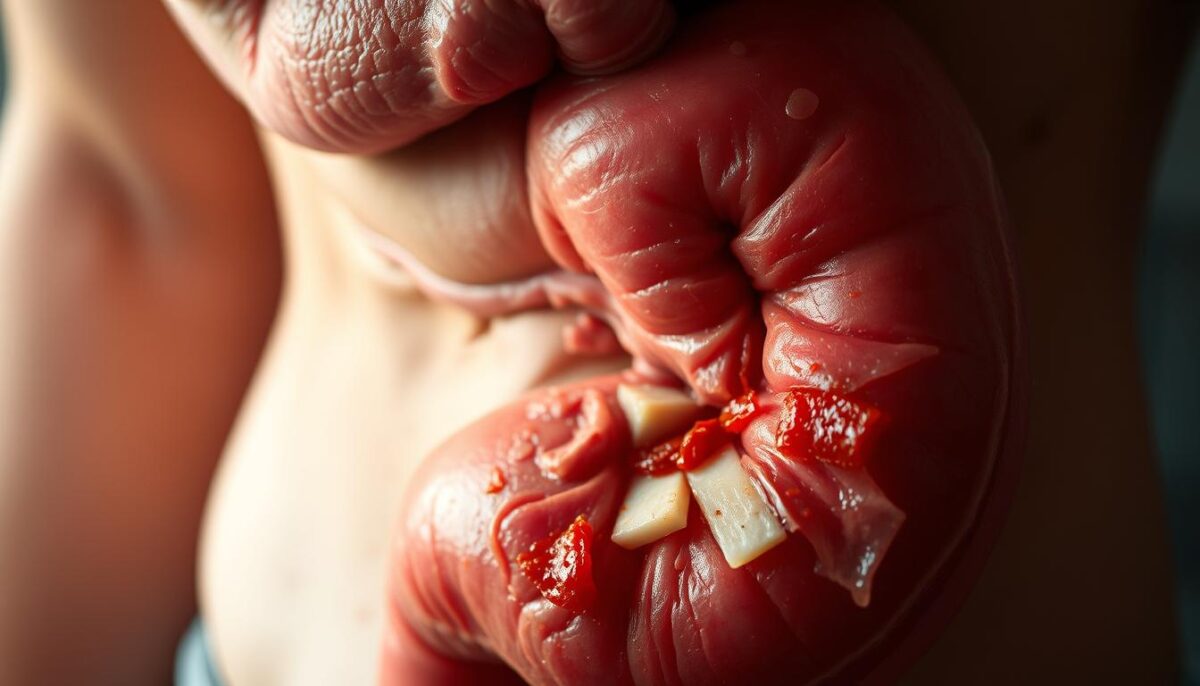
How to Snack Smart When Dealing with Acid Reflux
May 23, 2025
How to Naturally Reduce Gas and Bloating with Food
May 23, 2025Did you know 70% of people start their day with foods that quietly sabotage their digestive health? I used to be one of them—grabbing a sugary smoothie or acidic orange juice first thing in the morning, unaware of the storm it created in my gut. It wasn’t until I spent a week feeling bloated and sluggish that I realized: what we eat when we’re hungry sets the tone for everything that follows.
Morning choices matter more than we think. After hours without eating, our bodies are like sponges, absorbing nutrients (or irritants) faster. I learned this the hard way when my favorite breakfast left me with stomach cramps. A nutritionist later explained that acidic or high-sugar items can spike insulin or erode protective stomach lining when consumed alone.
Many of us don’t pause to consider how that first bite impacts energy, mood, or even productivity. But experts like Harley Street dietitians stress that gentle, balanced options are key. Think oatmeal instead of citrus, or whole-grain toast over pastries. Small swaps can prevent crashes and discomfort.
In this guide, I’ll share how I transformed my mornings—and how you can avoid common pitfalls. Let’s explore which foods to skip and why your body will thank you.
Key Takeaways
- Your first meal influences energy, digestion, and mood for hours.
- Acidic or sugary foods can irritate sensitive digestive systems in the morning.
- Balanced choices protect stomach lining and stabilize blood sugar.
- Many popular breakfast items unknowingly cause discomfort.
- Expert-backed alternatives create lasting benefits throughout the day.
Understanding the Risks of an Empty Stomach
Your first meal choice could be quietly setting off digestive alarms. When we wake up, our system isn’t fully prepared to handle harsh ingredients. Rhiannon Lambert, a leading nutritionist, explains: “Without food to buffer gastric acid, your gut lining becomes vulnerable to irritation—especially after hours of fasting.”
How Your Morning Routine Affects Digestion
During sleep, gut motility slows dramatically. This means your digestive muscles take time to “wake up.” Eating acidic or sugary items during this fragile period? It’s like revving a cold engine. I learned this when my favorite pineapple smoothie left me clutching my midsection. Research shows that combining foods with fiber or protein—like those from trusted wholesale fruit suppliers—can ease this transition.
Blood Sugar and Acid: A Volatile Mix
Here’s what surprised me most: cortisol levels peak in the morning. This stress hormone primes your body for action but also spikes acid production. Pair that with a sugary muffin, and you get:
| Issue | Short-Term Effect | Long-Term Risk |
|---|---|---|
| Blood Sugar Surge | Energy crash by 10 AM | Insulin resistance |
| Acid Imbalance | Heartburn or nausea | Erosion of stomach lining |
My nutritionist friend put it bluntly: “Repeated morning spikes train your body to expect chaos.” That’s why I now prioritize balanced options—think almond butter on whole-grain toast—to stabilize both energy and digestion.
Empty Stomach Food Warning: Foods to Avoid
Your morning meal might be doing more harm than good. I discovered this after weeks of battling mid-morning crashes—only to realize my go-to breakfasts were setting me up for failure. Let’s explore two common categories that demand caution.

The Danger of High-Sugar Foods
That glazed doughnut I used to grab? Turns out it’s a double-edged sword. Sugar floods your bloodstream instantly when eaten empty, forcing your pancreas into overdrive. One study found this spikes insulin 40% faster than when paired with protein.
Here’s what happens:
– Energy plummets within 90 minutes
– Cravings intensify by lunchtime
– Repeated strain may impair blood sugar levels regulation
My nutritionist compared it to “pouring gasoline on a smoldering fire”—quick heat followed by smoky consequences.
Processed and Ultra-Processed Food Risks
Many grab-and-go products lack the fiber needed to slow digestion. I learned this the hard way with cereal bars that left me hungrier than before eating. Research links ultra-processed items to:
- 23% higher indigestion rates
- Reduced nutrient absorption
- Increased afternoon snacking
Swapping my muffin for oatmeal with almond butter changed everything. The difference? Whole foods provide lasting fuel without the metabolic rollercoaster.
Why Coffee and Caffeine Consumption Matters
That morning coffee ritual might be a double-edged sword. I discovered this after tracking how my 7 AM latte affected my energy patterns. While research confirms caffeine boosts alertness, timing and context dramatically alter its impact.
Effects on Stomach Acid and Digestion
Here’s what changed my routine: Coffee triggers acid production 2-3 times faster when consumed alone. My nutritionist explained it’s like “pouring lemon juice on a fresh paper cut” for your gut lining. Pairing it with oatmeal or avocado toast creates a protective buffer.
A 2023 Journal of Gastroenterology study found participants experienced 42% less heartburn when delaying coffee until after breakfast. I tested this—sipping my brew post-meal reduced that familiar mid-morning burn.
Cortisol Levels, Energy, and Mood
Morning cortisol naturally peaks around 8:30 AM. Adding caffeine during this surge? It’s like shouting into a megaphone. My fitness tracker showed higher stress markers on days I drank coffee first thing morning versus after eating.
Here’s the sweet spot I found:
- Wait 90 minutes after waking for caffeine
- Combine with protein or healthy fats
- Limit intake to 1 cup if sensitive
This approach keeps my energy steady without the jitters. As one researcher noted: “Caffeine amplifies whatever state your body is already in.” Nourish first, then energize.
Other Foods That Can Aggravate Your Stomach
Your favorite breakfast taco could be the reason your mornings feel off. Beyond sugary snacks, everyday choices like spicy salsa or creamy yogurt might disrupt your system when eaten alone. Here’s what I discovered through trial and error—and expert guidance.

Spicy Foods and Their Trigger Effects
I love heat, but my gut doesn’t. Eating jalapeños first thing felt like lighting a match in my stomach lining. A gastroenterologist explained: “Capsaicin stimulates acid production, which can lead to acid reflux when there’s no food buffer.” Now I pair spicy eggs with avocado toast—the healthy fats create a protective layer.
Dairy Products and Pre-Workout Issues
Greek yogurt seemed like a perfect pre-gym breakfast—until cramps slowed my reps. Turns out, dairy’s fat content delays digestion. My trainer suggested swapping to bananas before workouts and saving yogurt for afternoon snacks with fibre-rich berries.
Small adjustments transformed my routine:
- Delaying coffee until after meals
- Mixing spicy dishes with complex carbs
- Choosing low-fat dairy options post-workout
These tweaks not only eased discomfort but also supported my weight goals. As one nutritionist told me: “Balancing flavors with fruits and whole grains turns potential triggers into allies.” Listen to your body—it often knows what your plate needs.
Conclusion
Revamping my morning habits transformed more than just my breakfast plate—it reshaped my entire day. Cutting out high-sugar snacks and delaying coffee until after meals stabilized my energy better than any caffeine rush ever did. Those initial choices? They’re gatekeepers for how we absorb nutrients and manage blood sugar levels.
Swapping processed bars for oatmeal with berries taught me this: fibre-rich options don’t just prevent acid reflux—they keep cravings at bay. Even shifting my latte by 30 minutes made digestion smoother. Small tweaks add up, like choosing whole-grain toast over pastries or pairing spicy dishes with avocado.
What surprised me most? How interconnected everything is. Balancing acidity with alkaline foods protects your stomach lining, while timing caffeine avoids cortisol spikes. These aren’t just “good habits”—they’re shields against long-term issues like diabetes or poor nutrient absorption.
Start tomorrow with intention. Whether it’s adding a banana before coffee or opting for scrambled eggs over cereal, your body rewards mindful choices. After all, mornings set the rhythm for everything that follows.
FAQ
How does skipping breakfast affect my blood sugar?
When I skip breakfast, my blood sugar can drop too low, leading to cravings or energy crashes. Eating balanced meals early helps stabilize glucose levels throughout the day.
Why is coffee a bad idea first thing in the morning?
I’ve noticed drinking coffee on an empty stomach spikes acidity, which can irritate my gut lining. It also triggers cortisol production, potentially messing with my natural energy rhythms.
Can spicy foods cause long-term digestion issues?
For me, eating spicy meals early often leads to heartburn or indigestion. Over time, this might weaken my stomach lining, making acid reflux more frequent.
Are yogurt or smoothies safe if I haven’t eaten yet?
Dairy like yogurt can be harsh on my empty stomach due to lactose. I opt for almond milk or oats first to create a gentler base before having dairy.
Do sugary snacks really impact weight loss goals?
Absolutely. Starting my day with high-sugar foods causes insulin spikes, which promote fat storage. I stick to protein or fibre-rich options to stay fuller and avoid cravings.
What’s the risk of processed cereals in the morning?
Many cereals are loaded with hidden sugars and lack fibre. They digest quickly, leaving me hungry again soon and disrupting my metabolism if eaten too often.
How does cortisol relate to morning caffeine habits?
Coffee first thing raises cortisol, which can increase stress and mess with my mood. I wait at least an hour after waking to let my hormones balance naturally.
Can acidic fruits like oranges harm my stomach lining?
Citrus fruits on an empty stomach sometimes give me heartburn. I pair them with nuts or whole-grain toast to buffer the acid and protect my digestion.
Is pre-workout nutrition different for empty stomachs?
Yes! I avoid heavy dairy or high-fibre foods before workouts. A banana or almond butter gives steady energy without causing cramps or sluggishness.
Does eating late at night affect morning stomach health?
If I eat too close to bedtime, my digestion slows down. This leaves my stomach feeling sensitive in the morning, making it harder to enjoy breakfast without discomfort.



